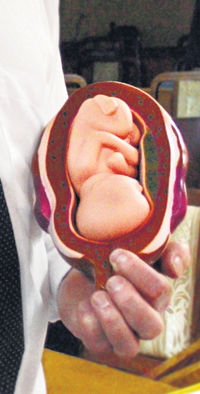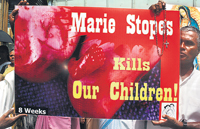|
‘Deadly
Choice’
Pro-life lobbyist Peter Smith who was in Sri
Lanka last week hits out at abortionists and UN family planning
associations
By Kumudini Hettiarachchi
Is it a choice like deciding whether one will
have a vanilla or a chocolate ice cream?
Shaking his head vigorously and answering his
own question, Peter Smith, a pro-life lobbyist, armed with reams
of paper and rubber models of a woman’s womb with foetus and
all, hollers out a resounding “No”. It is a “deadly
choice”, he propounds, explaining that if a person doesn’t
have the right to life from conception to natural death, every other
right comes to naught.
| About 650-750 abortions
are carried out daily in Sri Lanka , a study commissioned by
UNFPA in 1999 indicates, mostly among women over 35 years of
age. |
“The right to food, the right to housing,
you name it, it’s all nonsense if a baby doesn’t have
the right to life as soon as conception takes place. If abortion
is not a crime, might as well wait until the baby is born and then
kill him or her. Why abort in the womb, do it after birth and try
to justify that,” he challenges, adding that his pro-life
lobby is supported by most countries in the world, with only a handful
such as the European Union nations, Canada and New Zealand being
opposed.
What is the first measure of life, asks flamboyant
Peter who heads the Society for the Protection of Unborn Children,
an NGO accredited to the United Nations and can lobby there. Peter
was in Sri Lanka last week to foster the organization ‘Cultura
Vitae’ headed by Dr. Eshan Dias that has been set up in “defence
of marriage, family and the worth of every human being”.
 |
| Peter Smith holds up a rubber
model of a woman’s womb with foetus.
|
Dubbing the United Nations Population Fund (UNFPA)
and the International Planned Parenthood Federation – the
parent body of the Family Planning Association of Sri Lanka –
the Ugly Sisters, like in the famous fairytale, ‘Cinderella’,
he says their aim is to reduce the population in the developing
world. The First World’s dominance, especially America’s,
is threatened by population growth in the Third World. Adds Dr.
Dias: “The IPPF is the largest abortion industry in the world.”
Countering the argument put forward by many that
the biggest block to poor countries developing is over-population,
Peter quotes the Food and Agriculture Organization as indicating
that if First World farming technology is utilized to cultivate
the currently available arable land in the world, food could be
produced for 60 billion people, 10 times the current population
of the world. “The block to poor countries developing is the
European Union’s agriculture policy and the US policies which
heavily subsidize their farmers, making it difficult for farmers
in poor countries to compete with them.”
The twin evils of why some countries are poor,
Peter points out are corruption and war. “People are not the
problem. Massive population growth is not a hindrance to economic
growth,” he stresses citing reports. “Don’t blame
the women for having children and making a country poor.”
Dealing with the crucial issue of when life actually
begins, whether it starts the moment a sperm fuses with the egg
or a while later, he explains that within three weeks of conception
there is a heart beat.
According to a leaflet of Cultura Vitae abortion
is the direct and deliberate killing of a human being during the
period between conception (fertilization) and birth.
Conceding that the exceptions to saying no to
abortion would be an ectopic pregnancy (where the fusion of the
sperm and the egg occurs in the fallopian tube but the embryo is
unable to come into the womb due to a tubal block) and malignant
cancer in the womb or cervix which would need the removal of the
womb, both indirect forms of abortion, Peter stresses that direct
abortion will never help a woman.
According to Dr. Dias in the case of an ectopic
pregnancy or cancer, the mother’s life is in danger and the
treatment of the illness will indirectly cause the death of the
baby. Therefore, it cannot be considered an abortion, because an
abortion is the direct and deliberate killing of the baby which
is never justifiable.
When questioned persistently by The Sunday Times
about the plight of a child of 10 or 12 who is pregnant after being
raped or due to an incestuous relationship not of her seeking; a
woman who is raped or a woman who finds out that the foetus has
severe deformities, Peter is adamant that these were no excuses
for an abortion. “There should be support services for these
women,” he says.
“Yes, these are crisis pregnancies and it
becomes an issue between two humans, the mother and the baby. It
is a decision actually between a life and a lifestyle,” said
Dr. Dias.
 |
| A Cultura Vitae protest on June 24 opposite
a clinic in Ja-ela. |
“Rape and incest are emotive issues raised
by many women’s rights organizations to make abortion legal,”
stressed Dr. Dias adding that it is the first step down a slippery
slope ending in making abortion easily accessible. “Abortion
promoters know it. That’s how they have done it in other countries.
The psychological harm to any mother who undergoes
an abortion is immense, he says, quoting data from America. Compared
to women who give birth, those who undergo an abortion are five
times more likely to abuse drugs or alcohol subsequently; are at
65% higher risk of clinical depression and are 60% more likely to
be hospitalized for psychiatric care. Post-abortion women are at
elevated risk of death from all causes, including suicide.
Pointing out the physical harm, Dr. Dias says
even in countries where abortion is legal and said to be safe, women
who abort are four times more likely to die in the following year
than women who give birth.
‘Let
the women decide’ |
Abortion is illegal in
Sri Lanka unless it is performed to save the life of the mother.
The question of whether abortions should be liberalized or
legalized or should be allowed to remain illegal is an issue
which must be viewed within the context of current realities
of increased incest and rape, as well as the increasing number
of women seeking abortion services provided in the guise of
“menstrual regulation”. There are probably some
women who also obtain such services through private clinics
and medical institutions, stressed well-known women’s
and child rights activist, Dr. Hiranthi Wijemanne.
“Poor protection in homes particularly those in which
there is family strife and poverty including migrant mothers,
are contributing to an increasing number of girl children
getting pregnant. The perpetrators are not strangers but fathers,
stepfathers, and even grandfathers. The future of such children
is destroyed by such pregnancies because of the stigmatization,
interruption to schooling and other factors. It is also well
known that the risk of maternal mortality is much higher under
the age of 18 years,” she says, asking:
Should such victims of child abuse be given the facility
of a safe, therapeutic abortion so that they do not risk death
at the hands of a ‘backroom abortionist’? Should
they be told they must go through with the pregnancy because
abortion is illegal? Can they be protected from stigmatization
and interrupted schooling because they become ‘child
mothers’ and a crime was perpetrated against them?
These questions need to be answered, she said.
Another vulnerable group of women are rape victims some of
whom get pregnant, Dr. Wijemanne who has many long years of
working with the most underprivileged women and children,
told The Sunday Times. “Should they have or not have
a right to determine the continuation of their pregnant condition
which was a result of a violent act? We know children born
to such mothers run a serious risk of rejection and stigmatization.
Children should be born to be wanted and loved. They need
care and attention. They need health, nutrition and schooling.”
Abortion today is similar to family planning several decades
ago. The well-to-do have access to therapeutic and safe abortion
services. However, in the event of an unwanted pregnancy it
is the poor who have to resort to unsafe abortions, risk sepsis
and even death. The illegality of an abortion makes it very
difficult to obtain proper data and information. Whether made
illegal or not, there are large numbers of abortions taking
place in Colombo and other parts of the country. The majority
of such abortions are done in the name of “menstrual
regulation” and are conducted on married women at their
request. It is obviously a choice made by women, and even
by a couple for personal reasons, she said.
Why it is happening and the decisions on whether it should
or should not be done needs a deeper look. Could it be lack
of access to family planning services? Are there no family
planning counselling services available?
Is there a growing economic problem facing young families?
The issue of abortion directly relates to the reproductive
health of girls and women, Dr. Wijemanne said.
Why are women seeking services even when they know abortion
is illegal? Abortion cannot be taken lightly and even if done
on a therapeutic basis on medical considerations, post abortion
counselling is important, she said.
According to Dr. Wijemanne even if women and girls do not
have a choice, there is one of two things which can occur:
People can get the abortion done anyway, safe or unsafe; otherwise,
they have to go ahead with the pregnancy. As currently prevails
where the State and interested parties determine that they
must go through with such a pregnancy, there should also be
a commitment by such authorities to provide the necessary
resources and services to bring up such children who may suffer
deprivation. This is particularly so in the case of incest
and rape victims.
All the necessary inputs to enable a child’s healthy
growth and development should be provided, plus the essential
ingredients of love and affection without which children cannot
fulfil their full potential.
Today we live in a society in which mothers are leaving
young children in search of employment due to economic difficulties.
More women are working with no home help or an extended
family to help in childcare. If a mother decides to leave
her husband because of domestic violence she often has no
alternative means of livelihood. Maintenance for her children
may not be forthcoming because the estranged husband does
not pay her even if the court has decided that he should do
so. These are the realities for women in Sri Lanka today,
she explained.
“Let the final decision to sustain and maintain the
current illegality of abortion or liberalize or legalize abortion
be based on such realities. Women who bear the brunt of carrying
a child through nine months of a pregnancy, women who have
to go through child birth and its inherent risks to life and
health, women who have to work in the home and supplement
the family income, and women who have to suffer the violations
and trauma of gender based violence should be consulted in
making such choices. Indeed, many of them are doing so whether
the law provides for it or not!” Dr. Wijemanne added.
|
|

